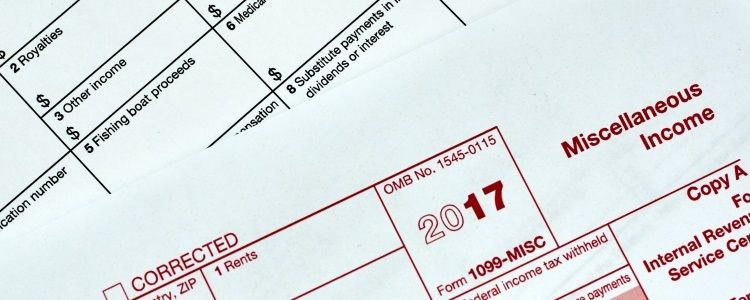Financing a vehicle only gets tougher when you add factors like bad credit and 1099 income to the process. There's a light at the end of the tunnel, though, and it may rest in the hands of subprime lenders.
Subprime Auto Lenders and Income Requirements
When you're looking for an auto loan with a lower credit score, it helps to start by working with a lender that can finance bad credit borrowers. These lenders, called subprime lenders, take additional factors into account along with your credit score so that they can get a better picture of your situation. Not all lenders are willing to dig as deep or finance people with poor credit, but subprime lenders do.
One of the most important factors subprime lenders look at is your income. You need to meet a minimum income requirement, which varies by lender. Many subprime lenders follow similar guidelines, and generally require you to make around $1,500 to $2,500 a month before taxes.
Your income also has to come from an acceptable source. Most lenders easily accept W-2 income, but if you're self employed as an independent contractor, things aren't as straightforward.
1099 Income Verification for Car Loans
You're considered a 1099 employee if you're self-employed or employed as an independent contractor. For tax purposes, these workers don't have taxes or Social Security withheld from their income by an employer, and must report their earnings to the IRS themselves. This is done with a Schedule C form; earnings after business expenses are reported on a 1040 form.
Not all lenders – including the subprime ones – accept 1099 employment as a verifiable source of income. As an independent contractor or a self-employed person, this means that both your income amount and job history may not count toward your car loan for all lenders. If a lender accepts this form of income verification, you typically need to bring at least two or three years of professionally prepared tax returns with you to prove your income.
If you're a business owner with poor credit, you're not as likely to find a lender that can work with you. However, as an independent contractor, who's not a business owner (i.e. you're a hairdresser, but don't own a salon or contract other hairdressers), you may have more luck getting a subprime lender to consider your work history if it's been consistent. This is done on a case-by-case basis, though, and varies by lender.
The reasons it's more difficult to find financing with this type of employment and poor credit has more to do with the bad credit auto loan experience from a lender’s point of view. Ever hear the expression a few bad apples spoils the bunch? This might be said for 1099 income verification.
As the subprime lending process has evolved, 1099 filers who don't record all their income for tax purposes may not show they make enough "on paper" to afford a vehicle. As this continued to happen, it has led to many 1099 filers being denied credit. The practice of reducing your taxable income on paper may have impacted how lenders view 1099 filers today. This may not seem fair overall, but it could account for why your income is judged on a case-by-case basis as a 1099 earner.
DTI Ratio for 1099 Income and Your Auto Loan
As a bad credit borrower, lenders not only need you to make enough income to meet a minimum income requirement, they also need you to prove your income isn't already being spent on other bills and payment obligations. If you don't have enough available income, lenders may not even consider you for a car loan approval. This is where your debt to income (DTI) ratio comes in.
Your DTI ratio is a simple calculation that subprime lenders perform to ensure you can comfortably make your monthly payment. They don't want you to stretch your income too thin because they know there are other costs involved in vehicle ownership.
If you have to choose between taking your car to be serviced or paying your monthly note, no one comes out on top. You won't want to pay for a vehicle you can't drive which could lead to default. On the other hand, if you skip a car payment to afford your auto repair bills, you may end up in default anyway.
For these reasons, lenders typically don't approve borrowers whose DTI is greater than 45% to 50% of their monthly income. To find out your DTI ratio as a 1099 worker, simply add together all your bills, including an estimated car loan and auto insurance payment, and divide the sum by your net (after expense) income. If you're already spending over 45% of what you're claiming on your tax return, you're not likely to be approved for a subprime car loan.
This doesn't mean you're out of luck completely – you may still be able to get the financing you need by going through a different type of lender, such as a buy here pay here dealer.
Improving Your Chance at a Car Loan Approval With 1099 Income
Getting an auto loan with bad credit isn't impossible. Neither is getting a car loan with 1099 income. It's the combination of the two that can cause a bit of a tripping hazard when it comes to the loan. So, to improve your chances of auto loan consideration, it's a good idea to be vigilant about your credit and take as many steps to help yourself as you can.
Here are a few tips to improve your chances at getting the vehicle financing you need when you have poor credit and 1099 income:
- Apply with a co-borrower – A co-borrower is someone who files a joint car loan application with you. When you take out a loan with a co-borrower, you're both listed on the title, you both own the vehicle, and you both are responsible for making sure the auto loan gets paid. The benefit of having a co-borrower is that lenders consider a combination of your incomes, so if you're a 1099 employee, it would help to apply jointly with a W-2 filer. However, you can't combine income with just anyone, a joint applicant must be your spouse or life partner.
- Improve your credit – You may not have to get all the way to a "good" credit rating to be considered more favorably as a 1099 filer, but it can improve your chances. Typically, anyone with a credit score of 660 or below is considered to have bad credit, so the higher your credit score is, the better off you're likely to be. If you're looking to improve your credit score, there are many different routes you can take, including getting a car loan. However, the easiest way to build your credit score is simply to pay all your bills in full and on time.
- Prepare a down payment – A down payment is one of the best ways to help yourself in every aspect of the auto loan process. The more you bring to the table in cash or trade-in equity, the less you have to borrow. A lower loan amount could make your case if a lender is on the fence about a car loan approval.
Finding Your Next Auto Loan
If you've taken all the steps you can to help your case when it comes to getting an auto loan with 1099 income, it's time to get over the final hurdle and find a subprime lender, and we want to assist.
At Auto Credit Express, we connect credit-challenged consumers to dealerships that are signed up with subprime lenders. This saves you time and stress, because you don't have to search all around town not knowing if the dealer you choose has special financing available.
Skip the hassle and sign up with us to be matched to a dealership in your area. Just fill out our fast, easy, and free car loan request form to get started today!
















